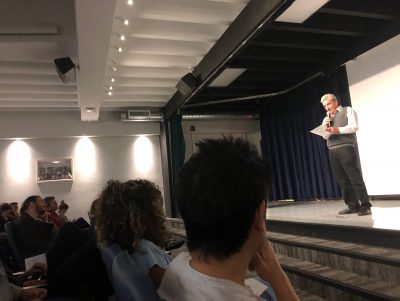
Professors and students filled the George Sherman Union’s Conference Auditorium to embrace poetry and participate in the Favorite Poem Project. The project has been running for two decades now, encouraging more Americans to embrace the “vocal art.”
Robert Pinsky, 39th U.S. poet laureate, launched the project in 1998 and has since invited people from across the country to take part by asking participants to read their favorite poems aloud. Tuesday night, the project came to campus for a video screening and launch that included recitations from students.
Through the Favorite Poem Project, Pinsky tasked himself with shattering the notion that Americans generally dislike poetry. Over the course of the project, a president and high schoolers alike have chosen to share their favorite slice of what Pinsky considers to be a physical art form.
“Each reader collaborates with the author of the poem by giving a voice to it,” Pinsky remarked to the audience before the readings.
Filmmakers Devin Hahn and Roberto Mighty directed six new poetry reading videos to show together in the auditorium. Readers in the compilation video shared favorite poems from Wallace Stevens, Walt Whitman and Elizabeth Bishop.
Mike Eruzione, an Olympic gold medalist, admitted in his video segment that he didn’t know many poems, but chose Walt Whitman’s “O Captain! My Captain!” because his father used to read it to his family.
“Mike was definitely my favorite,” Taryn Rostovsky, a senior in Boston University’s College of Fine Arts, said after watching the segment that highlighted Eruzione’s life off the ice.
College of Arts and Sciences senior Jahnavi De Sousa participated in one of the videos and said she chose her selected poem because it provided the words she could not produce herself after she found herself lost after a daunting mental health diagnosis.
“This is why I had problems, this is why I hurt you with my words,” De Sousa said. “But then, how do you explain that to someone?”
De Sousa said she is from India, and a certain social stigma persists in the country around mental health issues. She said that when looking for a poem to read aloud, she searched for authors who focused on empathy until she found Anne Sexton.
“I confess I am only broken by the source of things; / as if words were counted like dead bees in the attic,” she read from Sexton’s poem, “Said the Poet to the Analyst,” in the video.
Laura Marris, director of the Favorite Poem Project, said that part of what makes the project and events like these so special is the intimacy and personal attachment each person has to their poem.
“We really focus on each person reading the poem in their own voice,” she said in an interview.
Some individuals selected poems about coping with loss and imprisonment, and others chose other heavy topics. In his video, John Doherty, a construction worker from Braintree, expressed the initial intimidation he felt upon reading Walt Whitman’s “Song of Myself.”
“The last half-dozen lines are so encouraging,” Doherty said in his video. “In those last few lines, Whitman tells you what you’re thinking. He says that you probably didn’t understand what you just read, but stay with it and you will, and you’ll love it.”
Marris said she has seen the project unite people and connect them on a personal level and that she finds the videos to be moving and relatable.
The videos and project also provide a great opportunity to establish community, according to Marris.
“It’s also seeing a window into someone’s life, but also their artistic taste,” Marris said. “You’re watching these video[s] that move you. To be able to see that reflected in other people is really amazing.”
Some participants found the videos to not only build community but provide an outlet for expression. In the first video, Mary Jane Doherty, a professor in College of Communication, commented that poetry is a vessel to “say something so big, with so few words.”
While few of the poem readings themselves lasted longer than a minute or so, the context and personal introduction provided insight into the reader’s selection process.
“You can be an astronomer or a chef or a computer scientist,” De Sousa said, “but you still connect to that one poem, and it’s so magical.”


















































































































Robert Pinsky • Sep 28, 2018 at 11:13 am
Mary Katherine Moore, thank you for doing such a clear, precise report of that event and of the project.